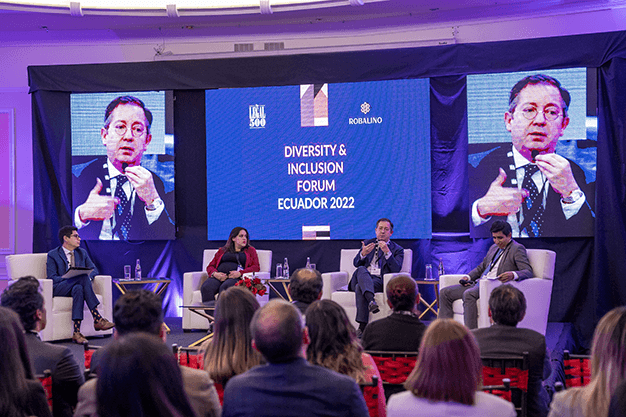Event Report
On the 18th of October, the Legal 500, Margherita Birri and David Freeman hosted the Diversity & Inclusion Forum Ecuador 2022 in Quito, in association with Robalino.
The event started with a question from Cristina Jaramillo Ramon, lawyer and ontological coach: ‘why is it important to speak about women in law?’ Because people are not means to an end and everyone should be comfortable with the people they work with. None should be discriminated against because they belong to the x, y, or z category. Karla Andrade, judge of the Constitutional Court of Ecuador, stated that people should be concerned not only about the visible but also about the invisible barriers. The ‘glass ceiling’ effect women and minorities face as they try to advance their careers. Despite improvements, the judge continues, there are no efficient public policies that address certain issues, and, also from the jurisprudential side, there are still issues of discrimination. One of the rulings involving the Court was on the unconstitutionality of the norm that differentiated the maternity period between the public and the private sector. Another one in 2020 was regarding the regulation that prohibited female police officers from becoming pregnant. Courts should be there to resolve those cases and not hide away from them. At the same time, people should claim their rights. It is of the utmost importance. ‘Achieving greater diversity is a good thing’, Jenny Peñaherrera, Legal counsel of Pluspetrol Ecuador points out. ‘We have to remember that we are the same company, the same country and we should look at each other’s welfare’. In multinationals, synergies are fundamental to building partnerships based on values, transparency and access to information. This should be the true objective as a country and as a Planet. The panelists indicated how women in the first place should not assume they have that role of care. ‘If it does not change with oneself, it will not change elsewhere’, Cristina affirms. Paola Gachet, Robalino’s partner, concluded the session by asking the audience to keep opening their minds, to keep reading, to bring the subject to the table and to let go of fear’.
The second panel was highly touching. As Robalino’s associate Diego Corral recalls, equality and non-discrimination are fundamental rights recognised in all international human rights instruments and included in the legislation of most countries in the world. Nonetheless, they are not fully respected. In fact, in many countries, including Ecuador, there is historical and structural discrimination that has hindered the development of groups of people, including the LGBTIQ+ community. It was not until 1997 that homosexuality was decriminalised in Ecuador. Since then, great changes have been achieved through activism and strategic litigation. Some of the biggest milestones especially in recent years with the recognition of the identity of transgender people on identity cards, allowing two women to be listed as mothers of a child, and equal civil marriage. Despite all this, much remains to be done, especially in the private sphere. For the LGBTIQ+ community, the glass ceiling is reinforced, since the challenge begins with the lack of access to the world of work. This is why it is necessary to ‘change the chip’. Dialogues on discrimination are often accompanied by the words tolerance and acceptance, which denote a willingness to do no harm, to respect, but fall short of the ideal of real inclusion. The session explored the personal struggle of the speakers as well as of the LGBTIQ+ community. An extremely important lesson from this panel was about the role of the State. As Jorge Gomez Tejada, director of Corporación de Promoción Universitaria stated, ‘The State should not go beyond a certain point; it is a fiction that we created and we have given it way too much power. Above all, it should not guarantee me the right to be a human being’. It should have an educational role, not an oppressive one as ‘totalitarianism to genocide is a small step’, Jorge continued. Therefore, as Felipe Ochoa Mogrovejo, former undersecretary for diversities in Ecuador recalled, the private sector has a preponderant role in guaranteeing inclusion. Private enterprise must commit themselves so that diversity and inclusion is not just part of a checklist or an ideal, but a reality.

